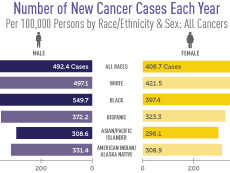
The National Cancer Institute has many resources to help you and your loved ones. Learn about the most common types and rarest forms of cancer, the biggest treatment challenges, and the disease's impact on the world. Find out who is most at risk, types of cancer screenings, andwhat you can do to lower your risk.
Understanding Cancer
Cancer is not one disease, but a collection of related diseases that can occur almost anywhere in the body. At its most basic, cancer is a disease of the genes in the cells of our body. Genes control the way our cells work. But, changes to these genes can cause cells to malfunction, causing them to grow and divide when they should not—or preventing them from dying when they should. These abnormal cells can become cancer.
Understanding how genetic changes cause cancer is one way to understand this disease, while cancer statistics is another. Cancer statistics help scientists understand the burden of cancer on society. Statistics can tell us things such as how many people are diagnosed with and die from cancer each year and the number of people who are living after a cancer diagnosis. Changes in statistics over time can help scientists find areas where progress is needed.
Cancer statistics also help scientists understand cancer health disparities. Examples of disparities include the higher cancer death rates, less frequent use of proven screening tests, and higher rates of advanced cancer diagnoses that are found in certain groups of people.
What Is Cancer?
Understand how cancer cells differ from normal cells and genetics changes that cause cancer to grow and spread.
Cancer Statistics
Basic information about cancer statistics in the U.S. and how they are used to understand the impact of cancer on society and to develop strategies that address the challenges that cancer poses.
Cancer Disparities
Certain groups bear an unequal burden of cancer. Learn about the factors that contribute to cancer disparities and find examples of disparities in incidence and mortality among certain populations.



































No hay comentarios:
Publicar un comentario